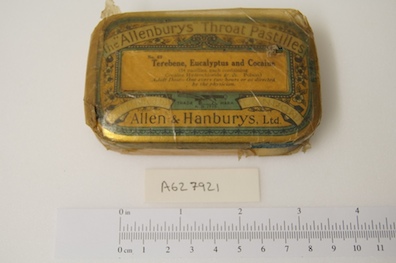In Lotus Eaters, Hades, and Ithaca Bloom
thinks of his father's death in 1886 from aconite poisoning.
In Circe he mentally reenacts the suicide by
imagining himself ingesting a “few pastilles of aconite,”
drawing the blinds of the hotel room in Ennis, writing a
letter to his son, and taking some soft breaths before
asphyxiation. Pastilles are small lozenges used to
deliver doses of medicine. Aconite is a poisonous plant of the
buttercup family, but it was used medicinally as an herbal
remedy for a wide-range of symptoms including fever,
constipation, anxiety, and sciatica.
The novel suggests not only that Rudolph deliberately used it
to kill himself, but that he may also have inadvertently
killed his wife through contact with the substance.
Aconite is known by many names, including wolfsbane, devil’s
hood, queen of poisons, monkshood, and (most interestingly)
women’s bane. According to the Encyclopedia Britannica
of Joyce’s time, in some varieties it is one of the deadliest
substances on earth. According to the Review of Natural
Products, as little as 2 mg of pure aconite or 1 g of
the plant may cause death from paralysis of the respiratory
center or heart. When used medicinally, aconite is
administered with extreme caution. Ithaca says that
Rudolph was being treated by "aconite, resorted to by
increasing doses of grains and scruples as a palliative of
recrudescent neuralgia." The episode also suggests
that the fatal dose came in the form of a lotion, not
lozenges: Rudolph has died "in consequence of an
overdose of monkshood (aconite) selfadministered in the
form of a neuralgic liniment composed of 2 parts of aconite
liniment to 1 of chloroform liniment."
In an essay titled “The M’Intosh Murder Mystery,” Journal
of Modern Literature 29 (2005): 94-101, the last of
three published essays on the man in the macintosh,
literary critic John Gordon speculates that aconite may have
caused not only Rudolph's death but also that of his wife
Ellen. Gordon suggests that since Rudolph intermittently
ingested aconite for his sciatica pain, and may have had
sexual relations with his wife while doing so, he perhaps
poisoned her accidentally, bringing terrible grief and guilt
on himself.
Aconite has mythical connections to Hercules, Medea and
Circe, among others, but is particularly famed for being a
lovers’ poison. In many stories women and men regularly ingest
aconite in order to kill their lovers instantly, with a single
loving touch. According to a 1944 article by Alfred Lewin
Copley and Helen Boswell in the Bulletin of the History of
Medicine, It was sometimes called thelyphonon,
meaning “women’s bane” or “women murdering.” The influential
Roman naturalist Pliny the Elder thought that women were more
susceptible to the poison, stating that “if the sexual parts
are but touched by it” the female will “not survive a single
day” (trans. John Bostock and Henry T. Riley, 1855).
Similarly, English botanist John Parkinson, in his Theatrum
Botanicum: The Theater of Plants (1640), says it
“speedily killeth even within a day” if “put into the secret
parts of females” (318).
Gordon cites this toxicity as one of many links between the
mysterious macIntosh man and Rudolph Bloom. Someone in Oxen
of the Sun who knows the stranger from his stay in an
insane asylum says that he thought he had “a deposit
of lead in his penis." Lead, like aconite, is a
deadly poison, and if ingested can cause insanity. The
stranger may feel that his poisoned penis killed the “maiden
all forlorn” who "Slung her hook." Rudolph
Bloom too is a mourning widower who lost his wits for a while.
If the macintosh man is his ghost, as Gordon suggests, then
the story recounted in Oxen suggests that he believed
himself responsible for his wife's death. His son Leopold
displays some awareness of this tragic history when he stands
contemplating Emily Sinico's death in Hades:
“Poor papa too. The love that kills.”
Is he thinking only of Rudolph's suicide, driven by Ellen's
premature death? Or does he also have some dim awareness that
her death was caused by erotic embraces?

